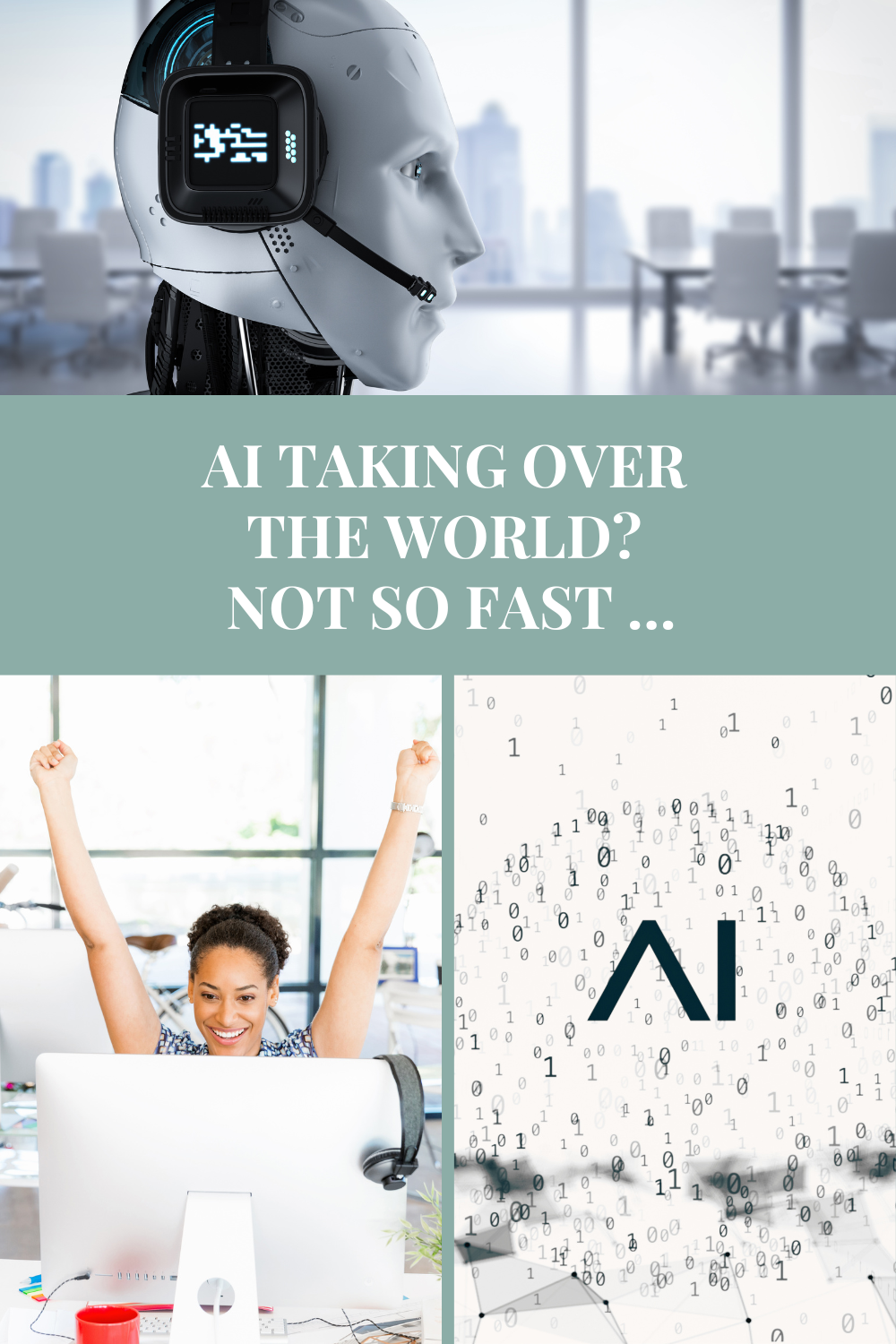AI taking over the world? Not so fast …
Are you anxious about the effect of Artificial Intelligence (AI) on your life and livelihood? AI development is accelerating at such a break-neck pace that perhaps, like me, you are worried about future prospects and getting left behind. I have been considering the way forward, looking at the AI landscape, not just for me but my countrymen and affected professionals.

Of late, thoughts related to the accelerated development of AI and its effect on life as we know it have lurked incessantly at the back of my mind, manifesting as a dark, foreboding presence in my heart.
Soon after, I started fretting about all things career, writer and entrepreneur in the face of the very real threat posed by all iterations of AI, gobbling up as it was income-generating activities and jobs, leaving us mere mortals with fewer and fewer options.
Cry my beloved South Africa
For many Africans, still struggling simply to get the basics, the future looks bleak. My home country of South Africa has its own, well-documented struggles. The BBC had previously reported that:
Eight out of 10 South African school children struggle to read by the age of ten …
BBC
Inability to read would relegate a large swathe of the population useless as they do not possess the most basic of skills even to write a simple prompt. Generative AI would widen the digital divide further and enable the “haves” to streak even further ahead of the “have-nots”. And that had would have a disastrous effect on South Africa and societies around the world. Scary, to say the least.

Generative AI is a type of artificial intelligence that creates new content, such as text, images, or music, based on patterns and examples it has learned from existing data. It’s like a creative machine that can produce original outputs by understanding and mimicking the patterns it has been trained on.
But first, what is generative AI. Ironically, I turned to ChatGPT to provide a simple answer:
The problem is that AI manages to do so at a blistering speed with impressive accuracy, making some of our meagre efforts pale in comparison. I used to think that automation would not affect creative industries. but now those are on the chopping block. To stay ahead of development would require creating the input to feed to the artificial intelligence.
Alternative careers
It preoccupied my thoughts. What jobs could I do that would not be replaced by AI? I realised that the ability to play an instrument and sing live could come in real handy.
That thought emerged as I was sat watching a show in celebration of a cousin’s milestone birthday. Humans still went out for a night of entertainment, I thought, as we watched the performers belt out some of the most beloved movie tunes from the 80s.
I started to wonder whether producing toilet paper and day-to-day necessities would help to future-proof my life. None of it was particularly comforting.
AI rollercoaster
In the midst of all these developments, an expert predicted that March 2024 would resemble March of the previous year, when humanity was bombarded by numerous announcements of AI development. It did not bode well. Where would it end?
The dizzying acceleration of the AI rollercoaster was threatening to drive me over the edge. OpenAI’s Sora had just made its appearance, for many proving to be an undeniable threat to video. The speed with which AI was infiltrating every aspect of our lives alarmed me. But then, vexingly, along came Google’s Gemini image-creating tool.
Gemini
Great was my surprise when I saw that Gemini’s image-creating tool was starting to trend for all the wrong reasons.
What happened? Gemini was producing images of historical figures that were clearly wrong. For example, the founding father of the United States, George Washington, was clearly depicted as a man of colour. So was the pope, Vikings and medieval knights. Misrepresenting history was what it was and it deserved the censure it received.
The rabbit hole unravelled fast:
- Gemini was generating images that were heavily melanin infused and gender mishaps also emerged. No pope had ever been female, but Gemini produced such an image.
- As a result, it led to a clear distortion and misrepresentation of history.
- That being the case, could users trust it as a search engine?
- What would be the impact on Google’s reputation?
- Would heads roll?
- How long would it take to rectify.
An apology
In the wake of its problematic launch, Prabhakar Raghavan, Senior Vice President, Knowledge & Information, apologised as follows:

Three weeks ago, we launched a new image generation feature for the Gemini conversational app (formerly known as Bard), which included the ability to create images of people. It’s clear that this feature missed the mark. Some of the images generated are inaccurate or even offensive. We’re grateful for users’ feedback and are sorry the feature didn’t work well. We’ve acknowledged the mistake and temporarily paused image generation of people in Gemini while we work on an improved version.
He continued, “So what went wrong? In short, two things. First, our tuning to ensure that Gemini showed a range of people failed to account for cases that should clearly not show a range.
“And second, over time, the model became way more cautious than we intended and refused to answer certain prompts entirely — wrongly interpreting some very anodyne prompts as sensitive. These two things led the model to overcompensate in some cases, and be over-conservative in others, leading to images that were embarrassing and wrong.”
Crisis averted?
Once again, I turned to ChatGPT to ask what it thought of his response as a crisis-management exercise. It was mostly positive. It pointed out that the issue was acknowledged, there was ownership of mistakes made, an expression of gratitude for feedback, was action orientated and an apology was offered.
I mostly agreed but would have liked some more details as to why it had been allowed to be rolled out. Had it been adequately tested and why was it so heavily biased towards diversity, equity and inclusion?
Elon Musk
Elon Musk, a notable South African by birth and one of the most prominent (and richest) men in the world, had been posting these incongruous images to his millions of fans. In fact, he was the one who first brought it to my attention and he had the clout to go asking questions.
Initially, it was presumed that the problems at Google would be fixed relatively quickly, only to let us know – on 26 February – that it was expected to be months.
Elon then also revealed that he was suing Sam Altman and OpenAI. The crux of the court case rested on the fact that OpenAI had started with humanity’s best interest at heart. But now Elon felt that its deal with Microsoft put that in jeopardy. I will be watching the proceedings.
OpenAI’s hit and misses
Sora
OpenAI had teased the capability of Sora with its ability to generate one-minute clips from a very basic prompt. It became clear that multimedia industries could lose their bread and butter. Would videographers, photographers, editors, creatives, etc. become obsolete?
Not so fast was the Internet’s response. Where did it get copyright for images? Other questions like what OpenAI would charge and what the rendering speed of videos would be came up in the ensuing days.
ChatGPT
As much as Sora was soaring, all of a sudden, users started to experience a dip in effectiveness on the mother platform – it was producing pure gibberish.
The Independent reported that:
“In recent hours, the artificial intelligence tool appears to be answering queries with long and nonsensical messages, talking Spanglish without prompting – as well as worrying users, by suggesting that it is in the room with them.”

“It is not the first time that ChatGPT has changed its manner of answering questions, seemingly without developer OpenAI’s input. Towards the end of last year, users complained the system had become lazy and sassy, and refusing to answer questions.”
It would appear that it was not immune to having “human-like” breakdown after all. So to be clear, comforting even, as much as we are advancing at a dizzying, break-neck speed, there are still teething glitches. Humans are still necessary and important. We just need to remain at the forefront.
This is sentiment is perfectly expressed through Fei-Fei Li’s statement:
AI won’t replace humans, but humans using AI will.
Fei-Fei Li
Chatbot case of culpability

More evidence that our jobs are still safe came in the form of a chatbot. Yes, you read correctly. The chatbot, used by an airline, was caught giving a customer a wrong answer. The BBC had reported extensively on what had led to the incident involving the chatbot, but was clear was that the airline in question had to take responsibility for its use. One would certainly hope so. Read about it here.
The case is a curious one, but it is a victory for good old-fashioned human help. Travellers may want to consider the benefits of old-fashioned human help when trip-planning or navigating fares. “AI has advanced rapidly, but a regulatory framework for guiding the technology has yet to catch up,” said Erika Richter of the American Society of Travel Advisors. “Passengers need to be aware that when it comes to AI, the travel industry is building the plane as they’re flying it. We’re still far off from chatbots replacing the level of customer service required – and expected – for the travel industry.
Google’s giant headache
But back to Google, the fumbling behemoth. Its disastrous Gemini image-generating launch had ramifications that hit the bottom line. Forbes reported the following:
“Google parent Alphabet lost some $90 billion in market value Monday as controversy over the Silicon Valley giant’s generative artificial intelligence product made its way to Wall Street.
“This is a meaningful blunder in the PR battle surrounding [generative AI] and further suggests that Google is trailing and mis-executing in a fast-moving and high-stakes space,” Loop Capital analyst Rob Sanderson wrote in a note to clients Sunday.
“The issue for the stock is not the debate [over Gemini] itself, it is the perception of truth behind the brand,” Melius Research analysts Ben Reitzes and Nick Monroe wrote in a Monday note to clients.
“Regardless of your view, if Google is seen as an unreliable source for AI to a portion of the population, that isn’t good for business,” the analysts continued.
I continue to wonder about Google’s reputation amid growing calls for its CEO to step down. The company finds itself in an unenviable position as it is mired in controversy, lawsuits and misfiring product launches.
Google on Google
Google’s describes its own mission and responsibility as follows: “… to organize the world’s information and make it universally accessible and useful.”

“At Google, we aim to balance delivering information with protecting users and society. We take this responsibility seriously. Our goal is to provide access to trustworthy information and content by protecting users from harm, delivering reliable information, and partnering with experts and organizations to create a safer internet.”
As a company entrusted with no less than guarding our information on the Internet, it is extremely worrying.
And on 5 March, Google announced yet another core update, this after a number of disheartening updates – for bloggers and SEO experts – the year before.
AI needs to work for the workers
It is true, the outlook for workers is less than stellar. The Guardian provided a stark account for what 2030 could hold.
“The McKinsey Global Institute estimates that by 2030, tasks that account for up to 30% of the hours now worked across the US could be automated, and that AI will push 12 million American workers out of their jobs. Goldman Sachs predicts that AI will disrupt 300m jobs worldwide by 2030.”

What is one to do?
Well, sinking into a depression is not going to help anyone is it? Proactively, we need to seek opportunities where we make our mark in a way that a computer, AI-generated content, machine-learning, etc., cannot.
As a Christian, my struggle with this is also multi-layered. On one hand, I need to monitor the trends but on the other, God is also fully in control. He did not lead me on this path only to leave me destitute in the hands of a robot.
No, I have a living Father who knows what is best for me and has carved out a path for me to follow. My job is to keep listening to his voice and waiting for his prompting of what to do next. The Master Engineer also prompts and I had better be listening out for that.
Despite all this discouraging and disconcerting news, the understanding that our Heavenly Father looks out for us is so comforting and encouraging. I hope it is the case for you too.
If you have learnt anything from this blog post or have been comforted by reassurance in the sovereignty of God, let me know by liking the article. Any comments are most welcome too.
- The human value and capacity driving copywriting in 2025 - March 6, 2025
- Authenticity, professionalism and hope in a curated world - February 6, 2025
- Authentic epiphany watching the trailer for “With love, Meghan” - January 27, 2025







